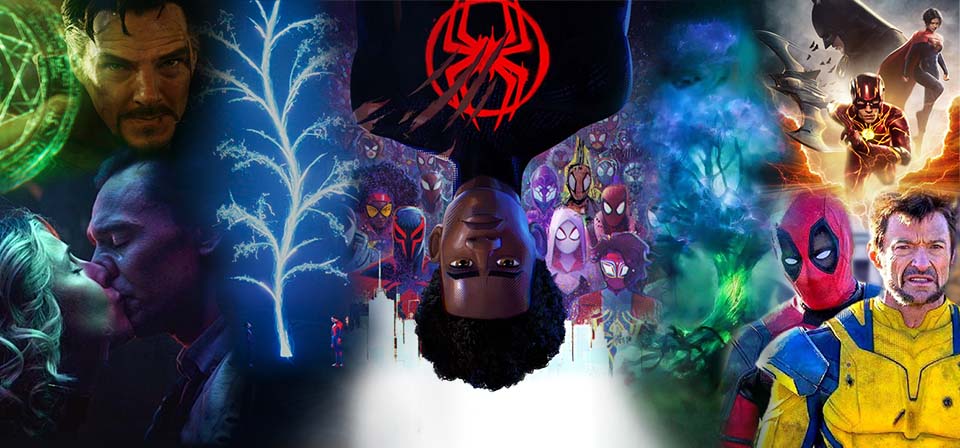Tags :: SDG Goes Long

Crisis of meaning, part 3: What lies beyond the Spider-Verse?
A question worth asking of a story, then, is: “Is there room for God in this story, in this world?”

Crisis of meaning, part 2: The lie at the end of the MCU multiverse
Sometimes it seems like the universe is sending you a message. In the MCU, the calls are coming from inside the house.

Crisis of Meaning on Infinite Earths, part 1: The multiverse and superhero movies
Is it possible to tell meaningful stories in a multiverse premise? Or does the multiverse idea tend toward nihilism?

Indiana Jones movies and Raiders of the Lost Ark: Why the original still stands alone
Eight years earlier, The Exorcist offered a gut-wrenching morality tale about, among other things, the spiritual dangers of messing around with Ouija boards and demons. The climax of Raiders offers a complementary warning about trifling with the no less terrible power of the holy.

A deep dive: The Little Mermaid then and now
There’s something profoundly melancholy about Disney returning, in its present state of creative exhaustion and corporate decadence, to The Little Mermaid — the nucleus from which the entire Disney renaissance exploded, in a way along with everything that has followed.

A deep cut: The Green Knight
After the library of books that is the Bible, no literary corpus means more to me than Arthuriana, and no Arthurian work means more to me than Sir Gawain and the Green Knight.

In search of true confession in the movies
Of the seven sacraments at the heart of the Church’s life, from the very beginning perhaps the most intriguing to filmmakers has been, ironically, the least visually impressive — a hidden rite involving only the minister and the recipient.
A house divided: A domestic family-film metaphor
Like Dorothy’s house, uprooted in fairy-tale response to her running away, physical domiciles in one family film after another are displaced, torn asunder, and undergo fantastic, traumatic crises and transformations in visionary mirroring of the upheaval in the characters’ lives.

How Catholic is Of Gods and Men?
Has any dramatic feature film ever more powerfully communicated the beauty and attractiveness of lived Christian faith, and of the Christian faith itself, than Xavier Beauvois’s Of Gods and Men?

The Seventh Chamber: Edith Stein, The Interior Castle and Auschwitz
The Seventh Chamber shows that for Edith it is only by knowing God that we know ourselves; only through Jesus that we know God; and only through the cross that we can know Jesus.

Fatherhood and Hollywood: Dads in the movies
Hollywood’s ambivalence about fatherhood is deeply entrenched. Ambivalence, though, is not mere hostility; often it is rooted in a real awareness of the irreplaceable importance of fatherhood, and in melancholy or anger over paternal failure in a fallen, broken world.

Lies, Damned Lies and Dan Brown: Fact-checking Angels & Demons
In a Q&A billed as an “interview” on his own website, Brown writes (in a comment recently highlighted by Carl Olson in This Rock), “My goal is always to make the character’s [sic] and plot be so engaging that readers don’t realize how much they are learning along the way.” Or how much misinformation they’re absorbing.

An American mythology: Why Star Wars still matters
Star Wars is pop mythology — a "McMyth," as a recent critical article put it — but in our McCulture even a McMyth can be vastly preferable to no myth at all, and certainly to other, less wholesome mythologies (e.g., the Matrix trilogy). Even for those who generally prefer more traditional fare, there is still much to enjoy and appreciate in these half-baked, stunningly mounted fantasies of good and evil in a galaxy far, far away.

Faith and fantasy: Tolkien the Catholic, The Lord of the Rings, and Peter Jackson’s film trilogy
J. R. R. Tolkien once described his epic masterpiece The Lord of the Rings as "a fundamentally religious and Catholic work." Yet nowhere in its pages is there any mention of religion, let alone of the Catholic Church, Christ, or even God. Tolkien’s hobbits have no religious practices or cult; of prayer, sacrifice, or corporate worship there is no sign.

The Last Temptation of Christ: An essay in film criticism and faith
We must not be too quick to judge any particular portrait of Christ merely because it challenges our expectations or makes us uncomfortable, or because it doesn’t immediately evoke his divinity. After all, Jesus himself often confounded the expectations of his contemporaries, and didn’t necessarily impress most of them as being divine.
Harry Potter vs. Gandalf
What defines morally acceptable use of good magic in fiction? Where, and how, do we draw the line? How do we distinguish the truly worthwhile (Tolkien and Lewis), the basically harmless (Glinda, Cinderella’s fairy godmother), and the problematic or objectionable (“Buffy,” The Craft)? And where on this continuum does Harry Potter really fall?
Recent
- Crisis of meaning, part 3: What lies beyond the Spider-Verse?
- Crisis of meaning, part 2: The lie at the end of the MCU multiverse
- Crisis of Meaning on Infinite Earths, part 1: The multiverse and superhero movies
- Two things I wish George Miller had done differently in Furiosa: A Mad Max Saga
- Furiosa tells the story of a world (almost) without hope
Home Video
Copyright © 2000– Steven D. Greydanus. All rights reserved.